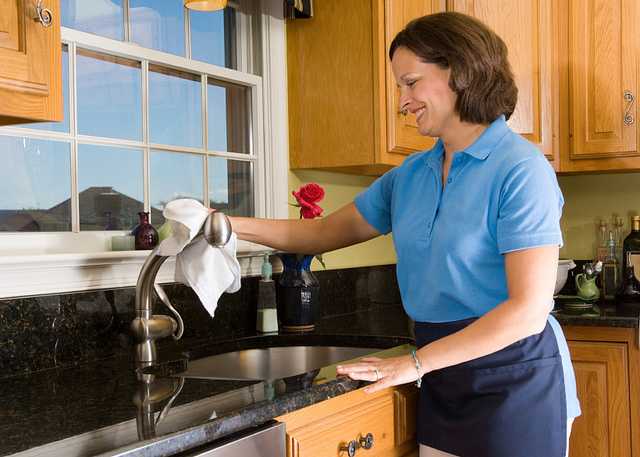
Photo by ncmaids
Many commonly used cleaning products contain toxic chemicals that pose a myriad of dangers.
Not only do these dangerous chemicals pose a risk to your pets and children, but they also cause damage to water quality, wetlands, and wildlife when they’re rinsed down your drain.
Certain chemicals are caustic, meaning they can cause eye, skin, or lung damage among other health problems.
To reduce these potential risks to your family and the environment, many homeowners are opting for more natural products to scrub sinks and clean drains. Below, you’ll find a few tips for cleaning your kitchen sink, as well as information on how to clean your kitchen drain naturally.
1. Gentle Scouring
Stainless and ceramic sinks can typically be cleaned by scouring with a powdered cleaner containing bleach. Cream-type cleansers, which combine detergent, scouring powder, bleach, and other ingredients, are also very effective. For a natural and effective scouring powder, use regular baking soda (sodium bicarbonate).
It’s gentle on the skin, safe for the environment, and won’t scrape or damage your sink. Sprinkle baking soda lightly onto the surface and scrub gently with a moist sponge or cloth. Baking soda removes everyday grime and rinses away easily with water.
2. Stronger Scouring
If your sink is very dirty, you may need an ore abrasive scouring powder. If you find that baking powder doesn’t provide sufficient friction, add a bit of salt to the sponge. Both regular table salt and sea salt will work for creating the strong scrubbing action you need to remove stubborn residue and dirt.
For even more cleaning power, mix the baking soda 50/50 with laundry detergent powder. Make sure you wear gloves, as laundry detergent is caustic and much stronger than baking soda.
3. Scouring Pads and Brushes
If you don’t want to use strong scouring powder, consider using a brush or scrubbing pad with baking powder instead. Brushes and pads increase the effectiveness of your baking soda scrub by providing additional friction.
Brushes and pads are most commonly found in metal varieties which can damage metal or plastic sinks, and aren’t environmentally friendly. To avoid damaging your sink, choose a natural bristle brush, or scouring pads made from wool or other natural materials. As an alternative, you can also use a natural sponge or loofah to scrub your sink without causing any damage.
4. Natural Drain Cleaning
Many drain cleaning chemicals are highly toxic and caustic. This can be a great concern if you have children or pets. To avoid using dangerous drain-clearing chemicals, make sure you maintain your kitchen drain regularly. You can do this using baking soda and vinegar. First, pour 1/2 cup of baking soda down the blocked drain.
Next, pour one cup of white vinegar into the drain and block it with the stopper. If you have a double sink, plug both sinks. The baking soda and vinegar react, they create carbon dioxide, which will blear the blockage by way of exerted force. Remove the plugs after 15 minutes and pour two quarts of boiling water into the drain. This will clear any congealed fats and wash the stoppage away.
By following the above tips, you can clean your kitchen sink and drain naturally. Instead of using caustic chemicals, consider harnessing the power of baking soda, vinegar, and mild laundry detergents to keep your kitchen clean.




Good one! It’s better to use natural household items for cleaning kitchen sink instead of harsh chemicals.This natural household items will beneficial for unclogged the sink.And You have shared very nice DIY tip.